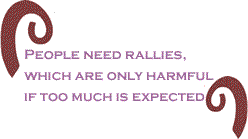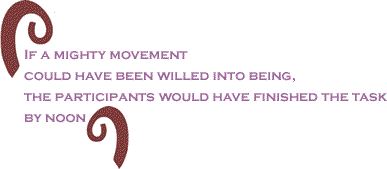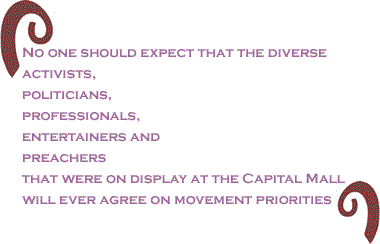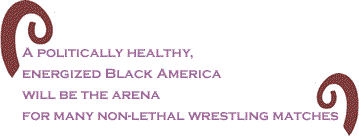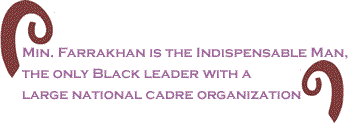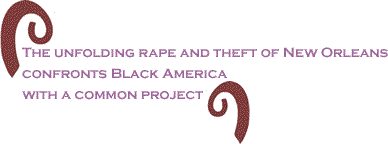
|
|||||||||||||||||||||
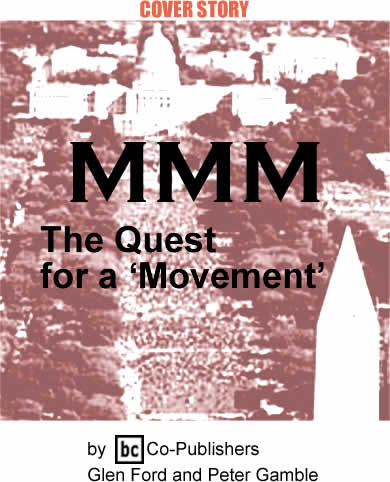 |
|
You can’t proclaim a mass movement into existence - but if you can bring together hundreds of thousands of people to hear the proclamation, you may be part of the way there. Haitian-American singer Wycliff Jean regaled the throng on Washington’s Capitol Mall with a hook deployed by speaker after speaker last Saturday: "This is not a march, we are building a movement, the Millions More Movement." After an early morning to dinnertime marathon of repetition, many in the vast crowd seemed convinced the proclamation was in effect. If a mighty movement could have been willed into being, the Millions More Movement participants, drawn from the broadest political spectrum of African American thought and activism, would have finished the task by noon under a clear blue sky. But of course, it’s not that simple. What the organizers did achieve was a mass reaffirmation of the existence of an African American polity, a form of Black nationhood that yearns for unity and autonomy in the struggle against white supremacy, and for its own sake. In this sense, the gender and (slightly) ethnically integrated Millions More Movement succeeded in making much the same statement as the significantly larger Million Man March, ten years before, although the current incarnation aims much higher. This general yearning for unity across class and religious lines is proof that Black Americans share a "distinct" worldview, a prism quite unlike not just whites, but other ethnic minorities as well, as concluded in a recent study by University of Texas sociologist George Yancey. The quest for independent political action - which includes the option of forging strategic or tactical alliances with other groups - is a Black historical constant. African Americans embrace the "concept of black autonomy as both an institutional principle and an ideological orientation," writes University of Chicago political scientist Michael Dawson.
However, "operational unity" - Saturday speaker and Kwanza founder Dr. Maulana Karenga’s phrase - requires that the component parts of the Black American polity share more than a general desire to "Rebuild, Restore, and Renew the Black Community," the Millions More Movement’s slogan. No one should expect that the diverse activists, politicians, professionals, entertainers and preachers that were on display at the Capital Mall (see Final Call.com News, October 17, 2005 for the full list of speakers) will ever agree on movement priorities, much less specific strategies and tactics, except in the case of catastrophic events such as the one-word horror, Katrina and, possibly, a clear and present threat to the Voting Rights Act. Katrina was the great MMM unifier, an issue around which substantive agreement could be found, as opposed to the generalities of the Covenant with God, Leadership and Our People and a 10-point Issues statement. The two overlapping documents do serve the very useful purpose of assembling those issues-areas that constitute the main arena of Black political and social concerns: unity among Blacks everywhere and with other oppressed peoples, quality education and housing, economic development under African American auspices, independent Black political power, reparations in some form, an end to police abuse and mass incarceration of African Americans, universal health care, autonomy and responsibility in the Black cultural sphere, an end to U.S. aggression in the world, and an affirmation of the African American spiritual legacy.
It is around these issues that a broad, progressive and longstanding Black political consensus revolves. However, there is no consensus, either among the speakers on the Mall or in Black America at-large, on how to achieve these highly generalized goals, and it is in practice that the fault lines (that have always been there) emerge. False Unity or Internal Struggle? Not only is it inevitable that there be internal Black struggle over ways, means and priorities, such conflict is the necessary evidence that a real movement is in the making. There is no such thing as a politically homogenous nation. Within the bounds of a shared world view, the various components of the Black national polity will wrestle with one another. That’s politics. A politically healthy, energized Black America will be the arena for many non-lethal wrestling matches. What, for example, is the meaning of "autonomy"? The NAACP, the two congresspersons in attendance on the Mall (Congressional Black Caucus chairman Mel Watt (D-NC) and Maryland Rep. Elijah Cummings), Christian clerics, New Black Panthers and the Nation of Islam certainly envision different versions of an autonomous Black America. Programmatically, their lines of march toward "autonomy" will diverge by varying degrees. The same applies to quality education, economic development, the nature and form of reparations, drugs, crime - virtually every issue of importance. If Black America has evolved over the generations as a true national polity - and it has - and if the various components of that polity are vigorous in pursuit of their version of Black progress, then there will be clashes. But that is a good thing, because in order to clash, one must be moving.
We are not there yet. A healthy Black national polity will function like an accordion. At times the sections of the instrument come tightly together - for example, the MMM’s demand for a New Orleans Citizens Bill of Rights: the right to return, to rebuild and to thrive in the "new" city. At other times, the various sections of the polity will draw away from one another like an expanding accordion as they follow different programmatic paths. The result is the music of a healthy polity. However, there are also those Blacks who act as front men, pretending to be part of the band while playing other people’s songs on gold plated instruments. Here’s a scene from the Mall: a vendor is hawking red-black-and green American flags, a clever nationalist souvenir. His wares are stuffed in a tote bag emblazoned, "5th Annual Symposium BAEO" - the Black Alliance for Educational Options. Are the vendor and his customers aware that the BAEO is an invention of the rich, racist Bradley Foundation and the Walton family, heirs to the Wal-Mart fortune? Is the lavishly funded BAEO, which is now also subsidized by the Bush regime through the No Child Left Behind program, to be allowed a seat at the Black table of autonomy? Professor Ron Walters, Black America’s best known political scientist, rightly called upon African Americans to create "our own political formations…. Any nation of 40 million must have its own political institutions." The Congressional Black Caucus, although entirely Democrat, is certainly a "Black" institution. Yet ten Caucus members voted for a harsh Republican bankruptcy bill, despite the plague of predatory lenders that infest their districts ensnaring constituents in bankruptcy-creating loans. The ten Black lawmakers were playing the credit card and finance companies’ tune. Should "unity" preclude us from denouncing these politicians and upbraiding Caucus leadership for silently tolerating such defections? Is the Black polity ready to finance Black candidates to run against African American incumbents who serve other masters? Are we collectively prepared to draw "bright lines" for legislative behavior, as the recently founded CBC Monitor has done? In other words, at what point is "unity" both false and counterproductive? The Ministry of Us Nation of Islam (NOI) leader Min. Louis Farrakhan is The Man with the Plan, the prime mover of the Millions More Movement and the 1995 Million Man March. Neither event could have possibly taken place without the leadership and organizational skills of the NOI, which occupies a unique position in the African American polity - by default. The NAACP is by far the largest Black organization; it has the masses, but not the will, to bring hundreds of thousands of Blacks together in one place. Rev. Jesse Jackson remains the most popular figure in Black politics, but has never built a standing organization. That leaves Min. Farrakhan as the Indispensable Man, the only Black leader with a large national cadre organization. The Millions More Movement was, deservedly, his show. Farrakhan envisions the creation of Black ministries, a kind of shadow government paralleling federal agencies. The roster would include Ministries of Agriculture, Education, Defense, Art and Culture, Trade and Commerce, Justice, Information, and Science and Technology. Most of these ministries would be funded through a formula that shifts tax dollars from federal agencies to their shadow Black counterparts based on the Black percentage of population. For example, since African American children make up about 14 percent of the school population, the Black Ministry of Education should be allocated 14 percent of the federal education budget. "Give us back a percentage so we can educate our own," said the NOI chief, as evening came to the Mall.
There is no doubt that Farrakhan’s undistilled Black separatist proposal would mean the death of public education in cities across the country - an outcome that would be welcomed only by the voucher-peddling, public education-hating Black Alliance for Educational Options and its reactionary white patrons. Essentially, Farrakhan is dreaming of a huge school voucher, to be dispensed yearly to the Black Education Ministry by Washington. Presumably, the states and localities that provide the vast bulk of education monies and are legally obligated to educate children, would use the same formula to rebate funds to local Black Education ministries. The devolution of African American schooling to the Black ministries would inevitably dilute or even sever government from its responsibilities to Black children, including the obligation to redress generations of substandard education - except for the annual voucher/check. Could the NAACP, the Urban League or any member of the Congressional Black Caucus unite with such a project? Indeed, is the scheme remotely palatable to any group or individual that operates within the historical Black Consensus, which has always maintained that the government is obligated to make good on its contract with all Americans? It’s a rhetorical question; there’s no need to answer. The Farrakhan formula is true to the logic of separatism, and is also the best (or worst) example of where an uncritical quest for "unity" can take us. Few of the component parts of the African American polity would seriously entertain Farrakhan’s proposal for even a second. Yet there it was, the climax of a long and often joyous day. It is good to rally Nonsense aside, this past weekend’s massive display of Black humanity was valuable in its own right. For those assembled on the Mall or watching the ritual remotely, the constant invocation of the words "us," "we," and "our" in the bright sunlight from the Capitol to the Lincoln Memorial was an experiential counterweight to those forces bent on smothering independent Black thought and action. Barack Obama’s Democratic National Convention speech notwithstanding ("There is not a Black America and a White America and Latino America and Asian America - there’s the United States of America!"), the vast majority of African Americans understand that history has made them one people - unique upon the Earth.
After generations of institution building and collective struggle, there is much more to the Black polity/nation than just a bunch of folks who are despised by another, larger and more powerful bunch of folks. The Black polity/nation exists for its own reasons, not merely to facilitate resistance to racism. It is a better, more human and moral nation than the one that surrounds it. Essentially, the Millions More Movement event was a giant rally. People need rallies, which are only harmful if too much is expected. Hopefully, the organizations that collaborated to make the event happen will forge some degree of "operational unity" on their own, in their various projects. The unfolding rape and theft of New Orleans confronts Black America with a common project, around which all can rally. In the absence of any other universally endorsed African American campaign - and in an era in which corporate media threaten to destroy any semblance of political sobriety - the simple exhortation to work harder, to "do something" was the best directive available for the assembled activist/citizens. So, we’ll let the architect, Min. Louis Farrakhan, have the last word: "We must go back home and organize as never before." |
|
 |
|
| Home | |
Your comments are always welcome. Visit the Contact Us page to send e-Mail or Feedback or Click here to send e-Mail to [email protected] e-Mail re-print notice
If you send us an e-Mail message we may publish all or part of it, unless you tell us it is not for publication. You may also request that we withhold your name. Thank you very much for your readership. |
|
| October20 2005 Issue 155 |
|||||||||
|
|||||||||
|
|
|||||||||
| Printer Friendly Version in Plain Text or PDF format. Download free Adobe Reader. | |||||||||
 |
|||||||||
 |
|||||||||
| |
|||||||||
| |
|||||||||





















